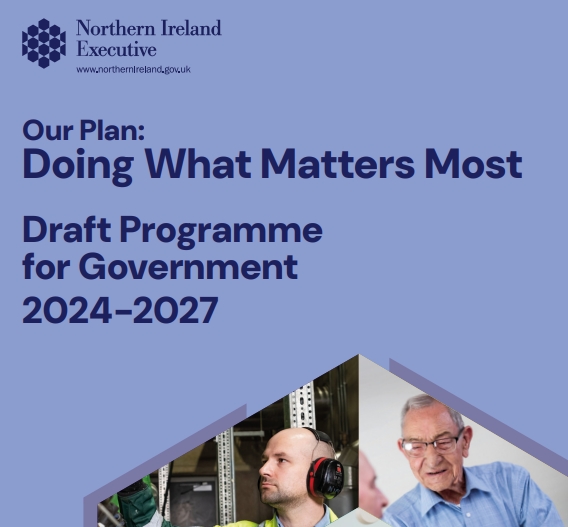‘Doing What Matters Most’ but not too much of it: Environmental action in the Northern Irish draft Programme for Government

The Assembly is back from summer recess, and we finally have a draft Programme for Government – “Doing What Matters Most”. This offers us a good opportunity to take stock: what exactly is the NI Executive planning to do for the environment? By looking at the draft PFG as well as the Agriculture, Environment and Rural Affairs questions answered in the Assembly earlier this week, we can identify, first, which environmental issues have earned a mention, which have been left off the agenda. Second, based on the space given to environmental matters in the PFG, we can surmise whether environmental action remains a side-show in Northern Irish politics.
The environment as one of the lucky few?
The PFG is stark in its warning – there is no money, tough choices have had to be made, “It is important that from the outset of this plan we are open and honest with you; we cannot afford to do everything that needs to be done” – and keen to share responsibility, asking the public to help decide what really needs to be done: “Tough decisions will be needed and so we are encouraging you to tell us what matters most to you by making your voice heard through the public consultation”.
While in many ways this echoes the type of language emerging from the new Labour government in the UK, it is important to reflect what this change of language means from an environmental point of view. Whether in NI or in the UK more generally, we are not anymore faced with governments claiming to be world leading/most ambitious but governments saying they are doing what they can, with the little they have. Holes in the environmental provision mirror holes in other domains – indeed there is no mention of culture or the arts in the whole PFG.
What makes the cut – climate and green growth
The PFG mentions the environment in two places. First, planet is one of the four Ps running throughout: the three missions of people, planet, prosperity, underpinned by peace. This apparently puts environmental action at the centre of NI politics. But the phrasing of ‘Planet’ shows how encompassing this mission is:
“Harnessing the potential of a green growth economy while ensuring we provide an equitable transition to a sustainable and affordable society as we take responsibility for decarbonising our economy and society.”
Draft Programme for Government
This is both wide in scope (economy, sustainable and affordable society), ambitious (we take responsibility, we provide…) and offers a narrow vision of the environment on green growth and decarbonizing. This prioritisation of climate over other environmental crises is also visible in the second place where the PFG mentions the environment. Protecting Lough Neagh and the Environment is one of the nine priorities identified. The section explains how: “tackling climate change and paying attention to our natural environment are critical for our wellbeing and our prosperity and can help unlock new opportunities”. There is a marked difference between tackling and paying attention.
This strong climate lens does not mean all non-climate issues are forgotten: NI’s first Environment Strategy (its first Environment Improvement), Water Quality and Flood Risk Management also get mentioned.
What about the rest?
But looking at the issues MLAs raised in the Assembly earlier this week, the PFG leaves out a number of important issues…and frames those it includes quite differently. The PFG is all about what the Executive wants to do.
The Questions were about what it needs to do: the EIP is mentioned but as a reminder there is an Office for Environment Protection investigation due to failure to adopt EIP on time; the OEP is further mentioned in driving change in approach to ammonia (in relation to its Water Quality report, although the OEP also investigated ammonia management directly). It is remarkable how the back and forth between Ministers and MLAs repeatedly builds on OEP work.
Another area where the Executive has to work on is the Windsor Framework – and in particular implementation of EU rules that apply to NI. For the environment, a long (since December 2019!) outstanding issue has been the Single Use Plastics Directive. We are finally getting (tentative) movement and clarification around who is supposed to transpose (London or Belfast?). The Minister announced that “Officials are working to progress legislation that will introduce restrictions on the most commonly littered single-use plastic items, such as straws and cutlery”. NI may finally be catching up on the rest of the UK and the EU…although the small scope of plastic types mentioned by the Minister (including also “a plan to reduce the consumption of single-use cups and food containers”) makes it likely Northern Ireland will remain a laggard in this domain.
Finally, while this four party Executive says the PfG is “different to anything we have proposed before”, there is no such things as a fresh start: the ‘new’ Executive has to deal with longstanding issues such as the Mobuoy Remediation Project.
Where next?
The PFG gives some grounds for hope. It was agreed by all parties and as such, issues it covers have good chance of progressing – including Climate Action Plan and adopting (finally!) the EIP. But it shows a very narrow understanding of environment action: on nature, on greening agriculture, much remains either unspoken or too controversial for the Executive to tackle. Sadly, the environment can’t wait.




